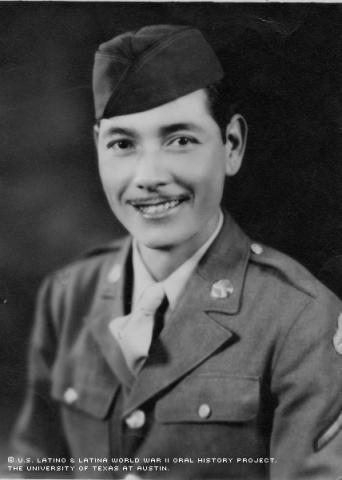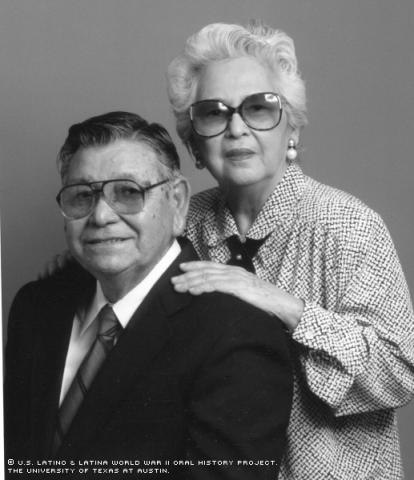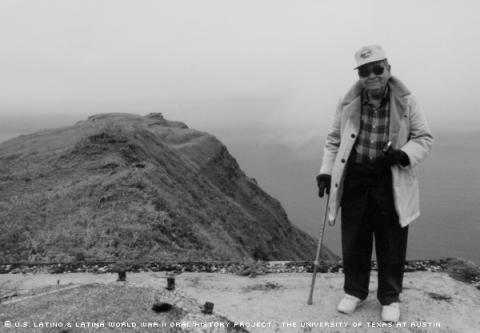


By Frank Trejo
A radio signal that happened to bounce all the way north to Dutch Harbor in the Aleutian Islands provided a lifeline for Ramon Martín Rivas during World War II. It was the early stage of the war and Rivas, a 21-year-old young man who had seldom traveled far from his impoverished South Texas community of Charlotte, found himself stationed in a forbidding wintry land 1,000 miles southwest of Alaska.
Rivas recalls that when he was on guard duty, around 3 in the morning, he sometimes could pick up a radio signal from a Spanish-language broadcast station in Eagle Pass, Texas.
It meant the world to him.
"Since I was the only Mexican American in my outfit, I used to have to practice speaking Spanish," he says in a quiet voice. "I used to keep myself speaking Spanish so I could speak to people when I came home."
Rivas, now 79, speaks matter-of-factly about the grinding poverty he experienced as a child and the life people like him faced in rural Texas communities before the war. Today, he says, there is no prouder American around than he. But as a young boy In Charlotte, Texas, patriotism and nationalism were secondary to survival; not only for Mexican Americans but for everyone.
"We didn't know anything like the United States of America, or 'I'm proud to belong to this country' or anything like that," Rivas said. "We didn't know the difference between that or anything else."
The youngest of 10 children, Rivas was only 4 years old when both his parents died within months of each other. An older brother, Carlos, known as "Chale," just 19 at the time, became the head of the household. He, along with Martin, Gregorio, Elias and their sister, Marla, struggled to keep the family together. The brothers raised cotton and corn and whatever crops they could on their farm in Charlotte.
"I believe we had a pretty good life, but not a complete life because of the lack of our parents," Rivas said. "As I remember today, we had a pretty good house, but it was not a home... We had to do everything on our own because we didn't have anybody to guide us."
Rivas attended school in Charlotte, one that was set aside for the Mexican Americans. He recalled that children in that school had to graduate from the fourth grade before they were allowed to enroll in the nicer school attended by Anglos in the community. But, he said, no Mexican American child that he knows of ever got that far. He never did. But he does consider himself more fortunate than some. He remembered that some of his brothers never went to school.
With the Great Depression of the 1930s, times became even harder. The family's crops brought in little money and sometimes the brothers would trave1 to other areas to pick cotton as a way to add to their income.
He recalled that the poverty was especially hard during his childhood years. He noted that all people, including Anglos, were poor.
"But my people, the Spanish-speaking people, sometimes had to go barefoot (to school)," he remembered. "Today, young people think there have always been these things, like refrigerators electricity, televisions, radio and things like that.
"In those days, there was nothing like that. Not even highways."
So when he was about 18, Rivas joined the Works Progress Administration, working on a school in Pleasanton and making $18 a month. It was a couple of years later - April 14, 1941 - that Rivas enlisted in the U.S. Army. His main objective: to make a little more money than he was earning with the WPA.
"The majority of us didn't know there was a war going on (in Europe)," he said. "As a matter of fact, none of the people, including Anglo-Americans; knew there was such a thing as a war, But there were no jobs."
After initial training at Fort Sam Houston in San Antonio, Rivas was sent to Galveston for additional instruction and eventually to Fort Bliss in El Paso, Texas. It was there that he joined the 206th National Guard from Arkansas, which was shipped to the Aleutian Islands.
He recalled his time in the Army as fairly good, and said he did not experience much discrimination.
"Oh, they kept calling names like 'spic', but since I didn't know any better or anything, we got along." Rivas said.
At Dutch Harbor, the troops sent the better part of three years constructing elaborate bunkers and trenches in preparation for an enemy invasion that never quite came. But, Rivas said his unit did come under attack once as Japanese planes flew overhead and then began dropping bombs and strafing the American soldiers. (Japanese troops indeed did occupy the islands of Attu and Kiska. The raid on Dutch Harbor in June 1942 apparently was an attempt to draw attention from the Midway operations.)
"Anybody who says they 'I didn't cry' or things like that, I say they had to be crazy, something wrong with their cabeza (head)," he said. "When you see bombs coming down like that, you cry and pray for your life."
After the war, Rivas returned to Texas, and married Henrietta Lopez, a girl he had met while on furlough in San Antonio. The two were married in 1942 and had seven children, one son and six daughters.
Rivas recalls with bitterness that despite his service in the military, he continued to encounter discrimination when he returned. On a trip he and his new wife took to Oklahoma, they were refused service at a restaurant, even though he was in his Army uniform. After a series of odd jobs, sometimes traveling as far as Seattle, Wash., and then to Oakland, Calif., where he worked in a cannery, Rivas returned to Texas. He took over a barbershop in Devine, Texas. He charged 50 cents a haircut, and when the barbers association tried to pressure its members to raise their prices to $1.25, he refused because of the hardship the higher prices would mean for his customers. He recalled that some barbershops at the time refused to cut the hair of Mexican Americans or blacks.
"But when I opened the door (to his shop), it wasn't only for Mexican Americans, it was for anybody, anybody," he said. "I had a lot of Anglo customers and I had some blacks who came to my shop."
Rivas believes his barbershop was well patronized not so much because he gave great haircuts, but because of the way he treated people.
"I treated everyone with dignity because that's the way I wanted to be treated," he said.
Rivas believes World War II changed his life. But it still saddens him to see that racial and ethnic differences and discrimination are still part of society.
"I think nobody is more American that I am," he said. "I was born in this country and I spent 4 1/2 years of my life to fight the war. And yet, I'm still a Mexican American or a Mexican."
Mr. Rivas was interviewed in San Antonio, Texas, on June 12, 1999, by his daughter, Maggie Rivas Rodriguez.

